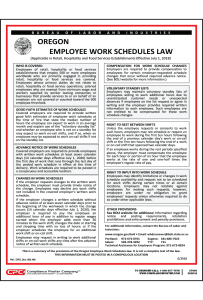The Oregon Predictive Work Scheduling Law Poster (also referred to as the Oregon Employee Work Schedules Poster) has been updated with revised information regarding who is covered by the law and more precise requirements for advance notice of schedule changes. The poster was revised to comply with regulations approved by the Oregon Bureau of Labor and Industries (BOLI) after the law was passed.
The revised version of the Oregon Predictive Work Scheduling Law Poster is now available from CPC for $5.95. CPC’s posters are professionally printed and double-Poly Vinyl, ensuring that posters remain legible and protected from defacement and tearing in compliance with mandatory posting requirements.
Oregon Predictive Work Scheduling Law
 The Oregon Predictive Work Scheduling Law went into effect on July 1, 2018, making Oregon the first state to join the municipal movement to mandate secure scheduling (also known as “predictive scheduling” or “safe scheduling”) for specified workers in the service industry.
The Oregon Predictive Work Scheduling Law went into effect on July 1, 2018, making Oregon the first state to join the municipal movement to mandate secure scheduling (also known as “predictive scheduling” or “safe scheduling”) for specified workers in the service industry.
An employee covered by the Predictive Scheduling Law is defined as an individual who is:
- Employed by an employer which is also a retail, hospitality, or food services establishment.
- “Engaged in providing services relating to” retail trade, hotels and motels, or food services.
- Not a salaried employee.
- Not a worker supplied to an employer by a worker leasing company.
- Not an employee of a business that provides services to or on behalf of an employer.
An employer covered by the Predictive Scheduling Law is defined as an employer which:
- Is a retail establishment, hospitality establishment, or food service establishment according to the 2012 North American Industry Classification System.
- Employs 500 or more employees worldwide.
- Employee count is determined by calculating the average number of employees employed over the course of each workday during each of 20 or more workweeks in the current or immediately preceding calendar year.
- Chains and integrated interprises are included in the definition of an employer and for the purposes of employee count.
The law requires covered employers to provide covered employees with a written “good faith estimate of the employee’s average work schedule at the time of hire, and a written work schedule for each work period. Starting July 1, 2018, weekly work schedules must be provided at least 7 calendar days before the first day of the schedule, but the notice period will increase to 14 days in 2020. Employers are prohibited from scheduling employees within mandated rest periods without employee consent.
Under the law, employers are also required to provide at least 7 days advance notice for some mployer-requested changes to the employee’s schedule. If the employer does not provide the correct amount of advance notice, he or she will be required to provide the affected employee with an additional hour of pay in addition to regular wages earned.
Regulatory Updates to the Oregon Predictive Work Scheduling Law
The regulations passed by Oregon BOLI also went into effect on July 1, 2018. The regulations narrow the applicable scope of the law by specifying that the predictive scheduling requirements apply only to employees whose primary duties consist of performing activities relating to the retail, lodging, or food service operations of a covered establishment.
For example, a bookkeeper who is employed by a restaurant would not be considered an employee for the purposes of the Predictive Scheduling Law because his or her “primary duties are related not to the food services operations,” but to other aspects of running the business. A server, cook, or dishwasher employed at the same restaurant would be considered an employee because those employees spend “the major part” of their time on duties associated with food service.
The regulations also provide important clarification on the good faith estimate of work schedule, advance notice of work schedule, right to rest between work shifts, record retention requirements, and unlawful employment practices. There is also guidance for employees covered by collective bargaining agreements or other contracts providing remedy equal to or better than remedy provided by the Oregon Predictive Work Scheduling Law.
For a complete overview, you can read the regulations here or visit BOLI to view Technical Assistance for Employers.
The Oregon Predictive Work Scheduling Law Poster
 The Oregon Predictive Work Scheduling Law Poster (also known as the Oregon Employee Work Schedules Poster) has been revised to specify that only employees of retail, hospitality, or food services establishments that apply 500 or more employees worldwide and who are primarily engaged in retail, hospitality, or food services are covered. Although the regulations do not specify, the updated poster states that employees whose primary duties do not relate to retail, hospitality, or food service operations (as well as salaried employees and workers supplied by worker leasing companies or businesses that provide services to or on behalf of an employer) are not counted towards the 500 employee threshold.
The Oregon Predictive Work Scheduling Law Poster (also known as the Oregon Employee Work Schedules Poster) has been revised to specify that only employees of retail, hospitality, or food services establishments that apply 500 or more employees worldwide and who are primarily engaged in retail, hospitality, or food services are covered. Although the regulations do not specify, the updated poster states that employees whose primary duties do not relate to retail, hospitality, or food service operations (as well as salaried employees and workers supplied by worker leasing companies or businesses that provide services to or on behalf of an employer) are not counted towards the 500 employee threshold.
The section of the poster which discusses Changes in Work Schedules has also been revised to state that the advance notice period required for changes to an employee’s schedule consists of seven calendar days prior to the beginning of the workweek in which the change occurs.
The Oregon Predictive Work Scheduling Law Poster must be posted by all covered employers. It must be displayed at the workplace where it can be viewed by covered employees. (O.R.S. 653.460)
You can order your revised Oregon Predictive Work Scheduling Law Poster online or contact a compliance adviser by telephone at 1-888-674-6104.
KEEP IN TOUCH WITH CPC!
To keep up with the latest in labor law news and posting compliance, follow us on Facebook, LinkedIn, or Twitter or subscribe to this blog! You can also contact us by phone, email, or chat to order one of CPC’s signature labor law compliance products or learn more about your company’s individualized posting obligations.
Please keep in mind that we are unable to provide legal advice.

